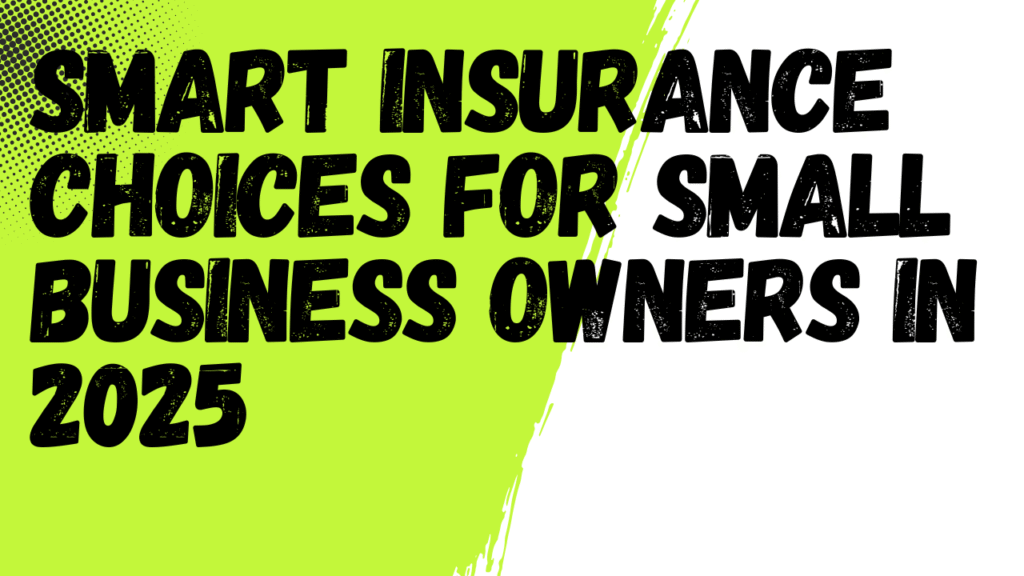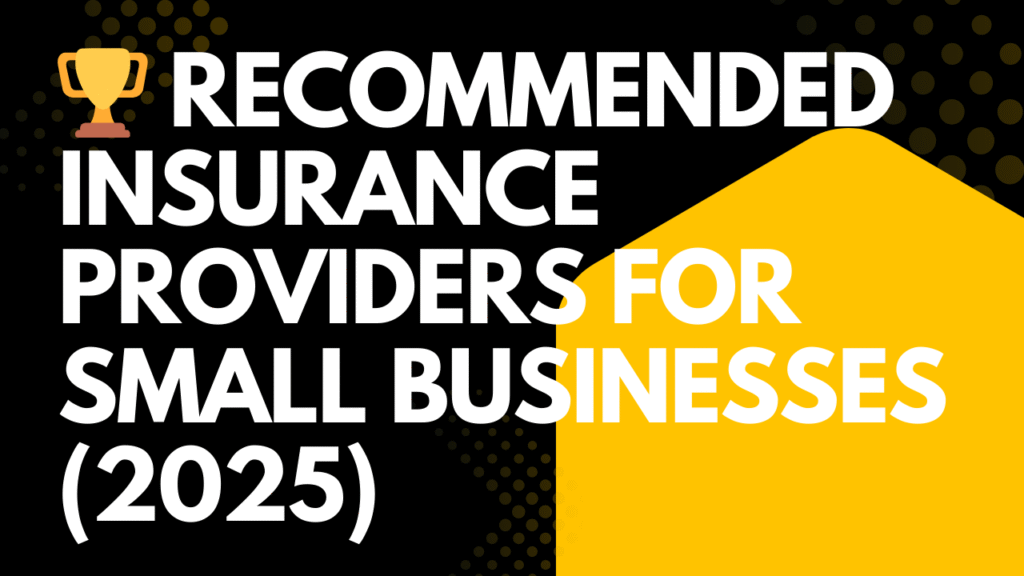🛡️ Smart Insurance Choices for Small Business Owners in 2025
As a small business owner, you wear many hats—CEO, accountant, marketer, and more. But one hat you can’t afford to ignore is that of risk manager.
From customer injuries to cyberattacks, your business faces potential threats every day. The right insurance policies can protect your assets, employees, and reputation, keeping your business running smoothly—even when the unexpected strikes.
This 2025 guide will walk you through the essential types of insurance for small businesses, how to choose them, and what mistakes to avoid.

📌 Table of Contents
- Why Insurance Is Critical for Small Businesses
- 7 Essential Types of Small Business Insurance
- How to Choose the Right Policies
- Factors That Affect Your Premiums
- Common Mistakes to Avoid
- Recommended Providers in 2025
- Final Thoughts + CTA
💡 Why Insurance Is Critical for Small Businesses
Here’s what the right insurance can do for your business:
- Cover medical/legal costs if someone gets hurt on your property
- Replace income if your business is forced to close temporarily
- Protect your equipment, inventory, and data from theft or damage
- Keep you compliant with local or federal regulations
- Boost credibility with clients and partners
📉 60% of small businesses that suffer a major loss shut down within 6 months if they’re uninsured.
🧾 7 Essential Types of Small Business Insurance
1. General Liability Insurance
Covers third-party bodily injury, property damage, and legal fees.
- Example: A customer slips in your store and sues you.
Cost: $350–$1,000/year
2. Professional Liability (Errors & Omissions)
Protects service-based businesses from claims of negligence or mistakes.
- Example: A client claims your financial advice caused a loss.
Cost: $500–$2,000/year
3. Business Property Insurance
Covers damage to buildings, equipment, furniture, and inventory.
- Example: Fire or flood destroys your office or inventory.
Cost: Based on property value and location
4. Business Interruption Insurance
Replaces lost income if you have to temporarily close due to a covered disaster.
- Example: A hurricane shuts down your storefront for 3 weeks.
Cost: Often bundled with property insurance
5. Workers’ Compensation Insurance
Required in most states if you have employees. Covers workplace injuries and lost wages.
- Example: An employee gets injured using machinery on-site.
Cost: Varies based on payroll and risk
6. Cyber Liability Insurance
Covers data breaches, ransomware attacks, and other cyber incidents.
- Example: Hackers steal your customers’ credit card info.
Cost: $500–$1,500/year for small businesses
7. Commercial Auto Insurance
Covers business vehicles or employee drivers.
- Example: Your delivery van is involved in an accident.
Cost: $750–$2,500/year per vehicle
🧠 Not every business needs all of these, but most need at least 2–3.
🎯 How to Choose the Right Policies
Follow these steps to tailor insurance to your business:
1. Assess Your Risks
Think about your industry, business model, number of employees, and customer interaction.
2. Start with General Liability
It’s the most common and broadest protection.
3. Add Based on Your Specific Operations
- If you store data = Cyber
- If you offer advice = Professional Liability
- If you have employees = Workers’ Comp
4. Consider a BOP (Business Owner’s Policy)
This bundle includes general liability + property insurance at a lower cost.
📉 Factors That Affect Your Premiums
| Factor | Impact on Cost |
|---|---|
| Business type | High-risk industries pay more |
| Location | Areas prone to disasters may cost more |
| Number of employees | More staff = higher workers’ comp |
| Claims history | Frequent claims = higher premiums |
| Coverage limits & deductibles | Higher limits = higher cost |
📌 Tip: Bundle policies or raise your deductible to reduce premiums.
⚠️ Common Mistakes to Avoid
- Buying the cheapest policy
– Cheap often means weak coverage. - Failing to read the fine print
– Know what is not covered. - Ignoring cyber insurance
– Even small businesses are top targets for hackers. - Letting policies lapse
– One missed payment can leave you unprotected. - Skipping coverage entirely
– Hoping nothing happens is not a strategy.

🏆 Recommended Insurance Providers for Small Businesses (2025)
| Provider | Best For |
|---|---|
| NEXT | Fast online quotes for all types |
| Hiscox | Customized for freelancers & startups |
| Chubb | High coverage limits for larger SMBs |
| Thimble | On-demand coverage (hourly/daily) |
| Progressive | Great for commercial auto |
| The Hartford | Excellent BOP options |
🚀 Final Thoughts
As a small business owner, you’ve worked hard to build something great. Insurance protects what you’ve built.
You don’t need every policy—just the right ones. Assess your risks, compare options, and choose coverage that gives you peace of mind and lets you focus on growth.
👉 Take Action Now
✅ Review your current business risks
✅ Identify 2–3 types of insurance you may need
✅ Get quotes from top-rated providers like NEXT or Hiscox
Smart insurance today = fewer business worries tomorrow.